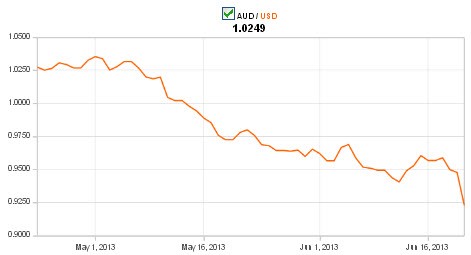Two bits of good economic news. The Financial Times has drawn attention to the way that iron ore prices this week have bucked the downward trend in commodity prices as measured in $US. Combine that with the substantial and very welcome fall in the value of the $A compared with the $US and we really do have some good news. Said the FT:
“Iron ore prices have rebounded to $120 a tonne, bucking the slide in other industrial metals and supporting investor sentiment towards the beleaguered mining sector.
Benchmark Australian iron ore has risen 8.2 per cent in the last week, hitting a 2½-week high of $120 a tonne on Wednesday. The commodity had fallen to a seven-month low of $110.40 at the end of May, according to The Steel Index, a price reporting agency.”
Showing the wrong graph. Graph things this way and the headlines scream bad news as if Australia’s currency is going to the dogs:

Plot the relationship the sensible other way around and we see the true good news story:

A house at stake. Little wonder that Paul Howes is continuing to back Julia Gillard. He should, after all, have his house at risk. As reported in The Age back in June 2011: “Union boss Paul Howes is continuing to back Prime Minister Julia Gillard in the top job … ‘I’m 100 per cent positive, I’ll bet my house on it, that Julia Gillard will lead Labor to the next election,’ he said.”
Well at least Paul is still on the favourite. From Betfair late this morning:

Act first and think later. A common thread in the way our federal government performs is the tendency to talk and act first and think later. The evacuation of families from Manus Island is just the latest example. I am sure that governing would be far better if ministerial private staffs were reduced back to the meagre levels of 40 years ago and advice was given instead by public servants.
A thought for the day. The Center for Economic Policy Research on how the assignment of claims to wealth through patents, copyrights, and other forms of intellectual property is a really big deal.
“… we spend $340 billion a year on drugs, more than 2 percent of GDP ($295 billion on prescription drugs, $45 billion on non-prescription drugs). We would probably spend about one-tenth this amount in the absence of patent protection. The difference is equal to about 20 percent of after-tax corporate profits.
And this huge gap between price and marginal cost gives drug companies enormous incentive to push their drugs as much as possible. This means concealing evidence that they are ineffective or even harmful. We routinely see stories about the drug companies responding exactly as economic theory predicts.”
News and views noted along the way.

- Estimate stars for the Queen in Gold Cup — Surely Her Majesty will set her for the Melbourne Cup next.
- Welcome to Russia’s Syria doublespeak — “While world leaders managed to produce a joint communique on Syria at the end of the G8 summit, the closing media remarks made it clear that Vladimir Putin hasn’t actually moved an inch on the issue. The Russian president once again lashed out at the European Union and the United States for considering arms shipments to the Syrian opposition, suggesting it will further destabilize Syria … Welcome to Russian doublespeak.”
- Iraq, Lebanon alarmed at spreading Syria war — “Syria’s turmoil is dragging its neighbors into a deadly confrontation between Shi’ite Iran supporting President Bashar al-Assad and Sunni Arab Gulf nations backing the Syrian rebels.”
- Brazil hit by largest protests yet as hundreds of thousands march
- Chinese, U.S. factories struggle, Europe still in slump







Crikey is committed to hosting lively discussions. Help us keep the conversation useful, interesting and welcoming. We aim to publish comments quickly in the interest of promoting robust conversation, but we’re a small team and we deploy filters to protect against legal risk. Occasionally your comment may be held up while we review, but we’re working as fast as we can to keep the conversation rolling.
The Crikey comment section is members-only content. Please subscribe to leave a comment.
The Crikey comment section is members-only content. Please login to leave a comment.